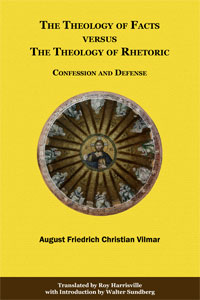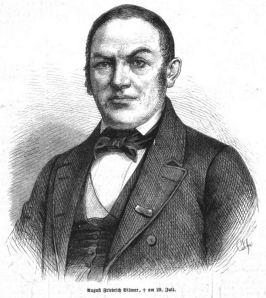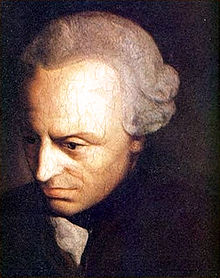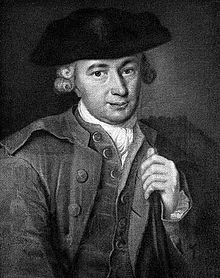When it comes to theology’s quest to be somewhat intellectually viable in the contemporary world, the Lutheran (LC-MS) intellectual Gene Veith offers high praise for Johann Georg Hamann – evidently a father of radical Orthodoxy – and Hamann’s current popularizer, the German theologian Oswald Bayer.
Veith on Hamann:
I am trying to get my mind around someone who was a catalyst for the cutting edge literature of German Romanticism AND linguistic analytic philosophy AND devout Lutheranism AND Radical Orthodoxy. I mean, how can a person be a mashup of the highly rationalistic David Hume, the wild-hearted poet Goethe, the existentialist Kierkegaard, and orthodox Lutheran theologians of his time and ours, all at the same time? I have the sense that grasping that synthesis may be a way forward for contemporary thought.
From what I can piece together so far, Hamann showed, with great sophistication, the limits of reason and the necessity of revelation–that is, the Word of God, which he then applied to the formative nature of language in general. I intend to read more. In the meantime, feel free to help me out, those of you who know about Hamann.
(I need help here to!)
Veith also quotes a part of the Wikipedia article on Oswald Bayer. Here is the part that stood out to me:
The center of theology is the promise of God to man to which man responds in faith. Faith is therefore always, to Oswald Bayer, a speech act, a spoken exchange between God and man. The exemplary center of this exchange is the Divine Service, the source and aim of all theology. Christian theology is therefore regarded as the interpretation of this speech act between the justifying God and the justified sinner.
Here is my question: Is simply confessing what God says to us back to Him theology or not? I ask because I am reading the book by mid 19th century Lutheran theologian August Friedrich Christian Vilmar (ELCA theologian Walter Sundberg, in the intro says the book “could have been written today”, so contemporary does it sound), and he says the following: “The knowledge of God which calls itself theology is at the same time a speaking from God. And speaking from God goes forth into the world, into human life.”
Do you see the difference?
This also put me in mind of what my own pastor’s evaluation of Erlangen theology, of which Oswald Bayer is a representative:
…the theologian in academia has two challenges: 1) To teach that which he should; 2) To be taken as intellectually viable. Since the enlightenment, the latter has trumped the former. The Erlangen school is appealing, for while rejecting divine inspiration, it accepts Scripture as a type of God’s Word; while rejecting the knowability of history, it accepts the events described within Scripture as a witness of the church to normative events; while rejecting a quia subscription to the confessions, it accepts the confessional nature of the church; while rejecting a standard hermeneutic of biblical interpretation, it accepts the idea that the church should be the one to interpret Scripture…In short, what Erlangen theologians attempt to do is to maintain some sort of Lutheran theology, based on what the modern intellectual community takes to be fact, or reality.
Regarding the usefulness of Hamann for today, I do not doubt we can say this to some degree. I recently read a superb article in the latest Lutheran theological journal LOGIA, “Biblical Hermeneutics in a Postmodern World: Sacramental Hermneutics versus Spiritualistic Constructivism” in which the author, Armin Wenz, holds up Hamann (citing Bayer’s use of him as well) as a great figure who, in critiquing Kant,
“already demythologizes two basic paradigms or principles that are also at work in postmodern hermeneutics: anamnesis and construction. Kant’s conviction that interpretation is only possible concerning ideas we ourselves have construed or rediscovered in our consciousness (that is, anamnesis) is unmasked as utter Platonism” (p. 18, unitalicized words italicized in original quote)
I will let you read the whole article to see how Wenz explains Hamann’s takedown of his friend, Immanuel Kant, although I will tell you that the term Scheidekunst (“art of divorce”) is key. But I will leave you with this tantalizing and relevant bit:
“…one might add the following to Bayer’s observations. The emphasis on the reader’s response for the sake of meeting the postmodern criteria of pluralism, subjectivism, and constructivism, takes place at the cost of forsaking the immanent truths and claims of the texts with their own specific efficacy.” (p. 18)
Now, some concerns about Hamann. The Wikipedia article on Hamann Veith quotes from says this:
“Hamann was a Pietist Lutheran, and a friend (while being an intellectual opponent) of the philosopher Immanuel Kant. He was greatly influenced by David Hume. This is most evident in Hamann’s conviction that faith and belief, rather than knowledge, determine human actions. Also, Hamann asserted that the efficacy of a concept arises from the habits it reflects rather than any inherent quality it possesses. Hamann famously used the image of Socrates, who often proclaimed to know nothing, in his Socratic Memorabilia, an essay in which Hamann critiques the Enlightenment’s dependence on reason.”
Here is where I get concerned: “Hamann’s conviction that faith and belief, rather than knowledge, determine human actions.” Now, this could just be a lack of nuance in the Wikipedia article or me not understanding the full context. That said, as the scientist-turned-philosopher Michael Polanyi showed us in the 20th c. the line between “faith and knowledge” is not as firm as we often think it is. For the Christian in particular, knowledge and faith go hand in hand, as one specifically thinks about Jesus talking about how eternal life is knowing the Father through the Son. A couple years ago, I wrote a blog post exploring this important aspect of theology and its implications, Knowledge first and foremost: baby King David vs. adult St. Thomas.
More recently, I pointed out how history is intimately related to this as well, saying “just because something that was revealed by God Himself in an unusual course of human events (for example, as He did with the disciples with His miracles, His transfiguration, His resurrection and the meaning of these) – as opposed to being the kind of knowledge that is gained during the regular course of human events – it does not make it anything different in terms of it being real knowledge that all men can, should and must know.” (see here for full context)
For example, the resurrection, after all, would seem to be the ultimate way the true religion is “materialized”, following closely on the heels of the incarnation. One of the fascinating things about the passage in Acts 17:31 is that the word that is variously translated proof or assurance is actually the same word in the Bible for “faith”. In other words, the resurrection of the God-man in history is God’s way of giving the world confidence that this same man, Jesus Christ, will be coming again to judge all persons. And I suggest that it is not the Church’s role to proclaim this resurrection merely as an article of faith, but an article of world history, an article of knowledge that all are to acknowledge.
That will make us popular, huh?
In all seriousness, I think this is the way to go, and that if we are trying to think of some way of being compelling in our conversation and proclamation to intellectuals, it is this reality that needs to be woven into our argument.
And I’m actually going to try to attempt doing that this coming week in a three part series titled “What, specifically, Jerusalem does not have to do with Athens: the history of the church vs. the non-history of the philosophers, or the theology of facts vs. theology of rhetoric writ large”. Though I’ve read much of Bayer – who is genius one can easily be swept away by for sure – I have in this series rather been spurred on by Vilmar, mentioned above. Stay tuned.
FIN
Vilmar pic: http://upload.wikimedia.org/wikipedia/commons/b/b7/August_Friedrich_Christian_Vilmar_%28IZ_51-1868%29.jpg
Bayer pic: http://www.lstc.edu/events/lectures/heritage-lecture-2012.php
Kant pic: http://en.wikipedia.org/wiki/Immanuel_Kant
Hamann pic: http://en.wikipedia.org/wiki/Johann_Georg_Hamann





